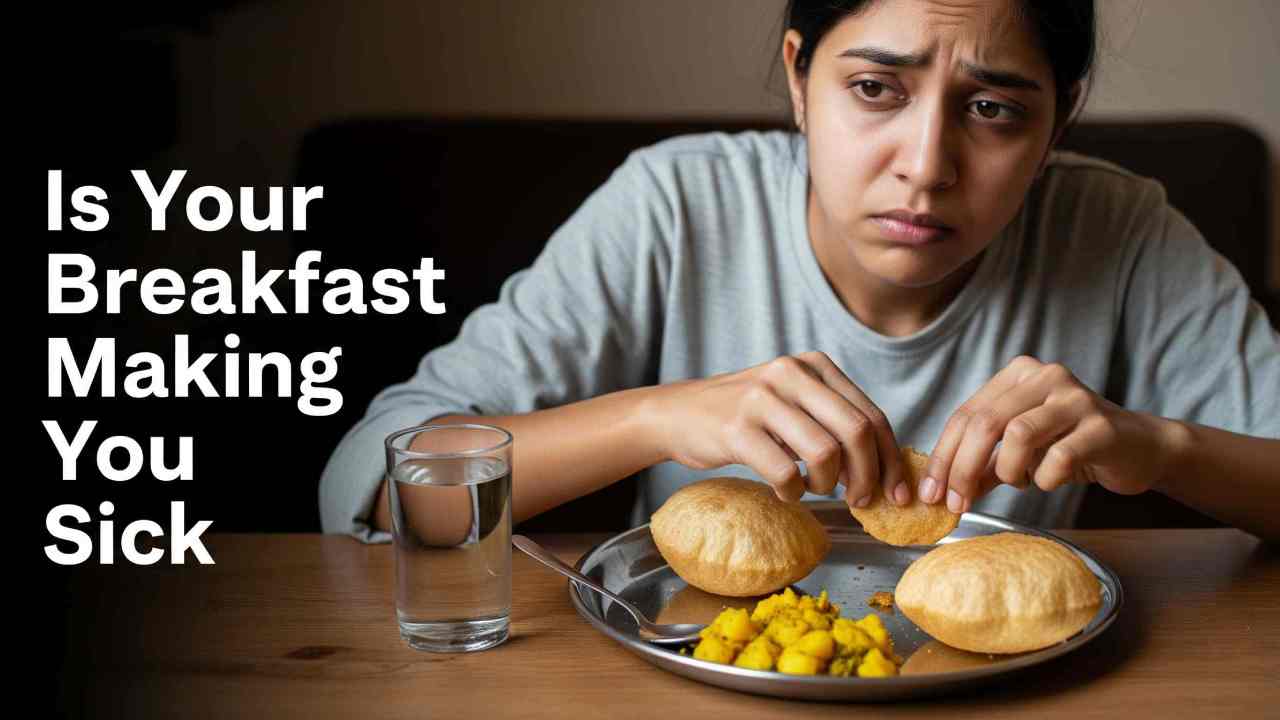Your "Healthy" Breakfast is a Lie. Here's What a Top Dietitian Says to Eat Instead
Verified By Ms. Sonika Choudhary | 09-Jul-2025
The morning rush is a familiar scene in every Indian household. In the midst of getting ready for work and school, the question of "What's for breakfast?" looms large. For decades, clever marketing has pushed convenient, colourful boxes of cornflakes, muesli, and instant noodles as the perfect solution. They promise a quick, "healthy," and "fortified" start to the day.
But what if these breakfast staples are secretly sabotaging your health goals? A recent expert rating sent shockwaves by giving cornflakes a score of 1, muesli a 0, and instant noodles a staggering -200. This begs the question: are we starting our day with nutrition or just a bowl of clever advertising?
To navigate this breakfast maze, we consulted Ms. Sonika Choudhary, Chief Dietitian at Kailash Hospital, Noida, who is widely regarded as one of the best dietitians in Noida. She believes that the foundation of good health is built on the first meal of the day. "Breakfast literally means 'breaking the fast' your body has been in overnight," says Ms. Choudhary. "What you choose to eat sets your metabolic and energetic tone for the entire day. Unfortunately, many popular choices are metabolic disasters disguised as health foods."
Let's break down why these convenient options fail the nutrition test and explore wholesome, powerful alternatives that have been a part of Indian wisdom for generations.
Table of Content
Before we can build a better breakfast, we need to understand what to avoid. The brightly coloured boxes lining supermarket aisles often hide some ugly truths in their nutrition labels.
The Sugary Deception of Cornflakes and Packaged Cereals
Cornflakes are often marketed as a light, crunchy, and vitamin-fortified breakfast. The reality is a far cry from this image. Made from corn, they are processed at high temperatures, which strips them of most of their natural nutrients. To make them palatable, manufacturers load them with sugar, malt flavouring, and high fructose corn syrup.
"Eating a bowl of most commercial cornflakes is akin to eating a bowl of sugar with some milk," warns Ms. Choudhary. "It causes a rapid spike in your blood sugar levels. Your body releases a surge of insulin to manage this, leading to a subsequent crash a couple of hours later. This crash leaves you feeling tired, hungry, and craving more sugary foods, creating a vicious cycle." The minimal fibre content does nothing to keep you full, making it a poor choice for sustained energy.
Muesli: The "Slightly Better" But Still Tricky Cousin
Muesli is often seen as the healthier, more sophisticated alternative to cornflakes. While it can be better, it's a minefield of hidden pitfalls. Many commercial muesli brands are "roasted" or "toasted" varieties that are bound together with sugars, honey, glucose syrup, or unhealthy fats like palm oil to create crunchy clusters.
"The key with muesli is to become a label detective," advises Ms. Choudhary. "Look for raw, untoasted muesli with no added sugar. The ingredient list should be simple: rolled oats, whole grains, nuts, seeds, and unsweetened dried fruit. Be mindful of portion sizes, as the calorie density from nuts and dried fruits can add up quickly." A seemingly healthy bowl can easily pack over 400-500 calories with very high sugar content if you choose the wrong kind.
Instant Noodles: The Ultimate Breakfast Villain
Scoring a shocking -200, instant noodles are perhaps the worst possible way to start your day. They are the epitome of an ultra-processed food, offering zero nutritional benefits. They are primarily made of refined flour (maida), which is devoid of fibre and nutrients.
"Instant noodles are a cocktail of sodium, unhealthy saturated fats, preservatives, and artificial flavours," states Ms. Choudhary with concern. "The incredibly high sodium content can contribute to high blood pressure and water retention over time. Starting your day with such a heavy, nutrient-void meal puts immense stress on your digestive system and offers no fuel for your brain or body to function optimally."
Also read: Revitalize Your Liver: Top Foods, Fruits, and Home Remedies for Safe Detoxification
The good news is that the ideal breakfast isn't found in a box. It's likely already a part of your culinary heritage. Traditional Indian breakfasts are scientifically sound, balanced, and delicious.
Embrace Traditional Wisdom: Idli, Poha, and Upma
These classic dishes are nutritional powerhouses.
- Idli/Dosa: Made from a fermented batter of rice and lentils, they are light on the stomach and a fantastic source of protein and carbohydrates. "The fermentation process is magical," explains Ms. Choudhary. "It pre-digests the nutrients, making them easier for our bodies to absorb. It also creates Vitamin B12 and introduces beneficial probiotics that are excellent for gut health." Paired with sambar (lentil and vegetable stew) and chutney, it becomes a complete, balanced meal.
- Poha: Flattened rice is a low-calorie, easily digestible carbohydrate. When cooked with onions, potatoes, peas, and peanuts, and seasoned with turmeric and lemon juice, it becomes a fibre-rich meal packed with antioxidants, iron, and healthy fats.
- Upma: Made from semolina (suji) and loaded with vegetables, this dish provides complex carbohydrates for slow-release energy and a good dose of vitamins and fibre from the veggies.
The Protein Punch: Besan Cheela, Moong Dal Chilla, and Eggs
Protein is the single most important nutrient for breakfast. It promotes satiety (the feeling of fullness), helps build and repair tissues, and stabilizes blood sugar levels.
- Besan/Moong Dal Chilla: These savoury pancakes made from gram flour or lentil batter are an excellent source of plant-based protein and fibre. "For vegetarians, a moong dal chilla is a superb way to kickstart the day," says Ms. Choudhary. "It provides sustained energy without the crash you get from refined carbs." You can stuff them with paneer or mixed vegetables to further boost their nutritional profile.
- Eggs: Whether boiled, scrambled, or as an omelette, eggs are a complete protein source. They are packed with essential amino acids, vitamins D and B12, and choline, which is vital for brain health.
Don't Forget the Fibre: Sprouts, Oats, and Dalia
Fibre is crucial for digestive health, and it helps you stay full for longer.
- Sprouts Salad: A bowl of mixed sprouted lentils (moong, chana, etc.) with chopped onions, tomatoes, and a squeeze of lemon is a living food, teeming with enzymes, protein, and fibre.
- Oats: Choose steel-cut or rolled oats over the instant, flavoured varieties. Cook them as a porridge (with milk, nuts, and seeds) or as savoury masala oats with vegetables.
- Dalia (Broken Wheat): Similar to oats, dalia is a complex carbohydrate rich in fibre. It can be made into a sweet porridge or a savoury khichdi with vegetables and lentils.
Also read: Boost Your Digestive Health: High-Fiber Foods for Constipation Relief
Establishing healthy eating habits starts early. For parents, ditching the cereal box in favour of a traditional breakfast can have a profound impact on a child's health, concentration, and long-term well-being. A breakfast rich in protein and complex carbs provides sustained fuel for the brain, improving focus in school.
"Many parents I consult are worried about their child's growth and development. They often seek a child nutrition specialist in Noida or their local area, but the solution often begins at the breakfast table," notes Ms. Choudhary. "A nutritious breakfast is directly linked to better cognitive function and physical growth. Trading a sugary cereal for a Moong Dal cheela or any cheela, a bowl of poha is one of the most impactful changes a family can make for their children's health."
The journey to better health begins with conscious choices, and the first choice you make each day is your breakfast. It's time to look past the flashy marketing slogans and reclaim the nutritional wisdom embedded in our own kitchens.
Swapping out that bowl of cornflakes for a plate of steaming idlis or a protein-packed chilla isn't just about changing a meal; it's about changing your entire day. You'll have more energy, better focus, fewer cravings, and a healthier body in the long run. Your breakfast should be a moment of nourishment, not a quick fix from a box. Choose wisely, and let your first meal set the stage for a day of vitality and wellness.



 +91-9711918451
+91-9711918451
 international.marketing@kailashhealthcare.com
international.marketing@kailashhealthcare.com







